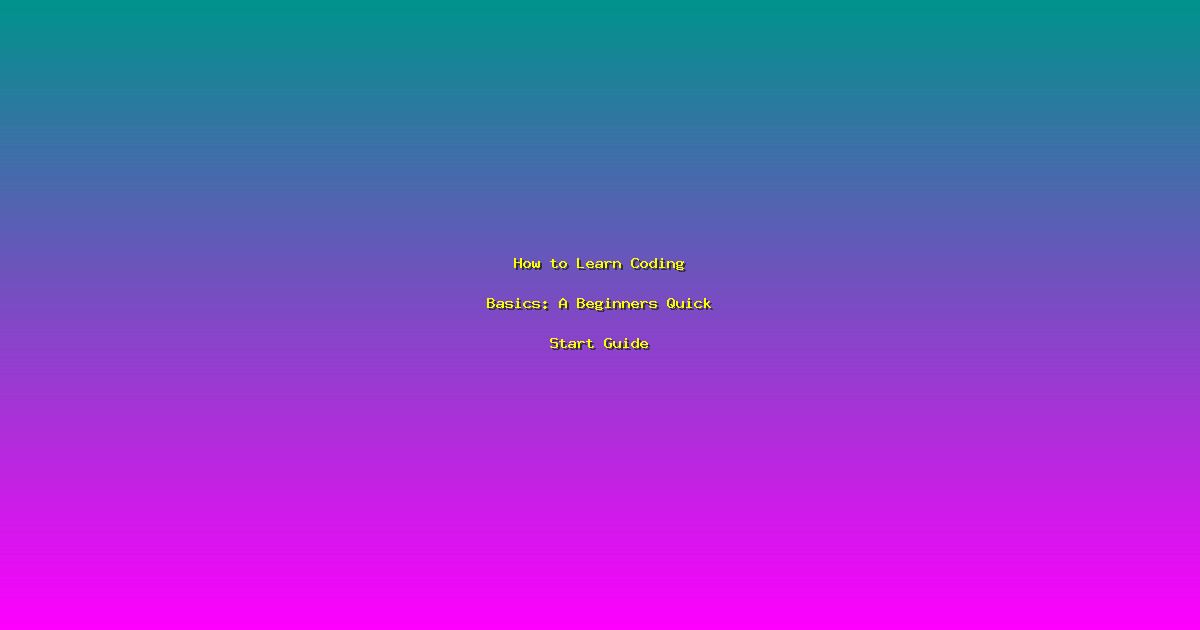How to Learn Coding Basics: A Beginners Quick Start Guide
Embarking on the journey to learn coding can be both exciting and daunting, especially if you're a complete beginner. But don't worry! This guide is here to help you take the very first steps into the world of coding in a simple and enjoyable way. By the end of this article, you’ll be well on your way to understanding the basics of coding and perhaps even writing your first lines of code.
Understanding the Basics of Coding
Firstly, it's important to grasp what coding actually is. Coding is the process of using programming languages to create software programs, websites, mobile apps, and various other digital products. It involves giving instructions to a computer in a language it understands to perform specific tasks.
Choosing the Right Programming Language
With hundreds of programming languages available, it might be overwhelming to choose the right one to start with. For beginners, languages like Python, JavaScript, or Ruby are typically recommended because they are relatively easy to learn and have a lot of resources available.
Setting Up Your Coding Environment
Before you can start coding, you need a coding environment. This can be as simple as a text editor and a web browser for HTML and CSS, or you might need to download an Integrated Development Environment (IDE) like Visual Studio Code or PyCharm for more complex languages.
Learning the Fundamentals
Once your environment is set up, it's time to dive into learning the basics. This includes understanding data types, variables, functions, and control structures like loops and conditionals. Many online tutorials and courses provide hands-on exercises to help you grasp these concepts.
Practice Coding Regularly
Practice is key in coding. The more you code, the better you’ll get. Try to find small projects or exercises to work on that align with your interests. This could be anything from creating a simple website to building a basic game.
Join a Community
Learning to code can be a lonely journey if you don't have a support system. Joining coding communities can help you stay motivated and give you access to help when you need it. Websites like GitHub, Stack Overflow, and Reddit have active coding communities where you can ask questions and share your work.
Frequently Asked Questions
1. What is the best language to start with?
Python is often recommended for beginners because of its simple syntax and readability. However, the best language depends on your goals and interests.
2. How long does it take to learn the basics?
Learning the basics can take anywhere from a few weeks to a few months, depending on your dedication and the time you can commit.
3. Is coding hard to learn?
While coding can be challenging, it is far from impossible. With persistence and the right resources, most people can learn to code.
4. Where can I find good resources to learn coding?
There are numerous free and paid resources available online, such as Codecademy, Udemy, Coursera, and freeCodeCamp.
5. What should I do if I get stuck?
Don’t panic! Try to debug the issue yourself first, then seek help from online communities or by asking more experienced programmers.
6. Do I need a computer science degree to learn coding?
No, you don’t need a degree to learn coding. Many successful coders are self-taught and have learned through online courses, practice, and community support.
Conclusion
Learning to code can open up a world of opportunities, from personal projects to a rewarding career. Start by selecting a language and learning the basics, and then practice regularly and connect with other learners. Remember, the key to success in coding is persistence and a willingness to learn continuously.
Call-to-Action
Ready to start your coding journey? Begin by picking a language and taking the first step today. Happy coding!

